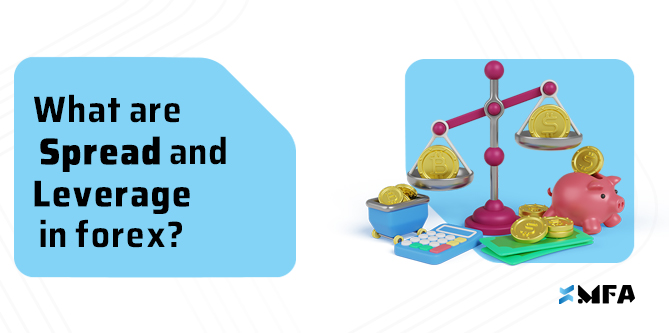Introduction | Two Critical Concepts Every Forex Trader Must Understand
In Forex, your success depends on more than just entry and exit points — spread and leverage play a massive role.
They impact your trading cost, your risk, and your ability to grow or blow your account.
In this MFA Signals guide, you’ll learn:
• What spread and leverage actually mean
• How they work with real examples
• How they affect profits and losses
• And how MFA helps you use both wisely
What Is Spread in Forex?
Spread = the difference between the Bid and Ask price of an asset.
Example:
• Bid: 1.1000
• Ask: 1.1002
• Spread = 0.0002 = 2 pips
→ You enter every trade in a slight loss.
Types of Spread:
1. Fixed Spread:
Doesn’t change during normal market hours. Great for predictable trading.
2. Variable Spread:
Moves with market volatility. May widen during news or low liquidity.
Tip: Lower spread = better cost-efficiency, especially for scalpers.
Why Is Spread Important?
• Directly affects your trade cost
• Lower spreads = better for short-term traders
• MFA Signals picks low-spread pairs for better value
What Is Leverage in Forex?
Leverage lets you control a larger position than your actual capital.
Example:
With $100 and 1:100 leverage, you can open a trade worth $10,000.
Pros of Leverage:
• Amplifies profit potential
• Reduces capital requirement
• Makes big moves accessible for small traders
The Risk Side of Leverage
• Amplifies losses the same way it boosts profits
• One wrong trade without risk control can wipe your account
• Beginners often misuse high leverage out of greed
What’s the Right Leverage for You?
| Trader Type | Suggested Leverage |
| Beginner | 1:10 to 1:50 |
| Intermediate | 1:100 |
| Pro / Prop | Based on firm rules (usually 1:100 or fixed) |
Spread vs. Commission (Key Difference)
| Factor | Definition | When It Applies |
| Spread | Built-in cost (Bid–Ask) | Always |
| Commission | Separate trade fee | Mostly in ECN accounts |
Low-spread accounts usually have commission; zero-commission brokers often charge wider spreads.
How Do Spread and Leverage Affect Profits?
| Factor | Impact | Explanation |
| Spread | Entry cost | Higher spread = harder to break even |
| Leverage | Risk exposure | Higher leverage = bigger swings |
How MFA Signals Help You Use Both Smartly
• Focus on low-spread pairs
• Recommend safe position sizes
• Offer risk-adjusted setups
• Guide VIP traders on smart leverage use
• Protect your capital while still chasing profit
Conclusion
• Spread is an unavoidable trading cost — minimize it
• Leverage is a double-edged sword — use it with care
• Combine both wisely for a long-term strategy
• MFA Signals simplifies the process with tailored trade setups
FAQs
What’s a good spread in Forex?
Under 2 pips for majors like EUR/USD is ideal.
Should beginners use high leverage?
No. Start with low leverage and grow with experience.
Does spread change during the day?
Yes. It can widen during news or market open/close times.

